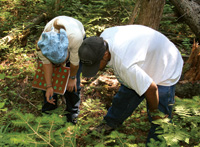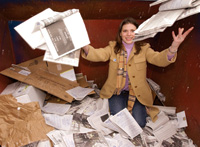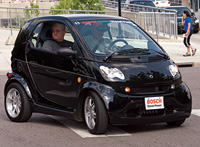Highlights | A Greener Maize and Blue
U-M Enhances Environmental and Energy Conservation Efforts
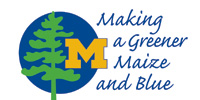
Staff, faculty, and students at the University will become even more involved
in campus environmental and energy conservation efforts as part of a six-point
environmental and energy conservation initiative (EEI) presented in April 2007
to the Board of Regents. Associate Vice President for Facilities and Operations
Henry Baier shared the three-year plan and recent operational achievements.
The
six-point plan includes the introduction of Wolverine Teams comprised of staff
from operations and facilities management to engage building occupants in speci
ic efforts to achieve energy and environmental conservation. The teams are
anticipating activities in 30 campus buildings in each of the next three years.
Other
components of the plan include compilation and distribution of an annual report
on consumption trends, research activities, and operations efforts; increased
efforts to purchase electricity produced from renewable sources; maintenance
and expansion of alternative transportation options for students, staff, and
faculty; strengthening procurement offerings to ensure green products are prominently
promoted; and revision of construction and renovation guidelines to improve
energy efficiency.

SNRE Hosts National Climate Change Summit
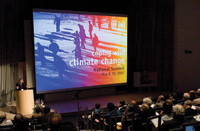 The School of Natural Resources and Environment (SNRE) hosted a three-day
summit—the irst of its kind in the nation—focused on helping the
United States prepare for the impact of climate change and the ongoing alterations
in temperature, precipitation, sea level rise, and species range.
The School of Natural Resources and Environment (SNRE) hosted a three-day
summit—the irst of its kind in the nation—focused on helping the
United States prepare for the impact of climate change and the ongoing alterations
in temperature, precipitation, sea level rise, and species range.
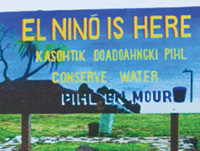 Experts attending
the NatIonal Summit on CopIng wIth Climate Change identified needs in four
critical areas: public health, energy industry, water quality, and isheries.
They also developed actions that could be taken by government, business, and
industry. The summit—held May 8-10, 2007—was part of the Clinton
Global Initiative, a non-partisan organization that helps devise and implement
innovative solutions to pressing world challenges.
Experts attending
the NatIonal Summit on CopIng wIth Climate Change identified needs in four
critical areas: public health, energy industry, water quality, and isheries.
They also developed actions that could be taken by government, business, and
industry. The summit—held May 8-10, 2007—was part of the Clinton
Global Initiative, a non-partisan organization that helps devise and implement
innovative solutions to pressing world challenges.
SNRE Dean Rosina Bierbaum
hosted the summit. Participants included: Thomas Karl, director of the National
Climatic Data Center; Susan Tierney, former assistant secretary of energy;
and Robert Corell, director of the Global Change Program, The Heinz Center.

A Greener Maize and Blue in Brief
Information technology is the latest thing going green at U-M with its commitment to participate in Google�s new Climate Savers program. As part of the program, U-M will identify and encourage units to select energy-efficient computers. There will also be a campaign to educate users on how to reduce computer power use. Energy efficient computers make about a $1.75 million difference in electricity consumption a year on a campus as big as U-M�s, according to Timothy Slottow, executive vice president for finance.
The Institute for Social Research, in collaboration with Plant Operations and the Utilities Reduction Committee, conducted a joint study of energy use attitudes and behaviors among U-M staff, faculty, and students. The initial report, issued in March 2007, recommended increased leadership, education, and motivation to help modify behaviors that would help improve University-wide energy conservation measures.
New equipment will be installed in the Hatcher Graduate Library air-handling system that is estimated to generate energy savings of approximately $180,000 per year, as well as improve occupant comfort in the building.
The Michigan Recycling Coalition recognized U-M as the 2007 Recycler of the Year for Outstanding Waste Reduction and Reuse. The award recognizes the University�s Student Move-Out Donation and Office Supply Reuse programs.
A study released in June 2007 by the U-M Center for Sustainable Systems says the state of Michigan can add $380 million a year and 3,400 full-time jobs to its economy by 2025 while reducing greenhouse gases 12 percent. Researchers presented their findings to the Michigan Legislature�s House Energy and Technology Committee.
Auto industry experts gathered at the U-M Power Center on June 12, 2007 for an interactive forum to discuss alternative fuel cars. The event was part of the Ann Arbor TechKnow Forums, which are designed to enhance the technology business climate in Southeastern Michigan. The forum featured expert presentations, a roundtable discussion, and product demonstrations.
Called �the Olympics of biodiversity,� BioBlitz was the U-M Biological Station�s attempt to document the assortment of species inhabiting the forests, fields, and waters surrounding its northern Michigan location. The event, held July 5�8, 2007, involved 10,000 acres, 20 scientists, 73 students, and a huge variety of biological and botanical specimens. Later that month at the station, graduate students in the Biosphere-Atmosphere Research and Training program held a two-day summit that focused on the implications of climate change in the Great Lakes area.


 The School of Natural Resources and Environment (SNRE) hosted a three-day
summit—the irst of its kind in the nation—focused on helping the
United States prepare for the impact of climate change and the ongoing alterations
in temperature, precipitation, sea level rise, and species range.
The School of Natural Resources and Environment (SNRE) hosted a three-day
summit—the irst of its kind in the nation—focused on helping the
United States prepare for the impact of climate change and the ongoing alterations
in temperature, precipitation, sea level rise, and species range. Experts attending
the NatIonal Summit on CopIng wIth Climate Change identified needs in four
critical areas: public health, energy industry, water quality, and isheries.
They also developed actions that could be taken by government, business, and
industry. The summit—held May 8-10, 2007—was part of the Clinton
Global Initiative, a non-partisan organization that helps devise and implement
innovative solutions to pressing world challenges.
Experts attending
the NatIonal Summit on CopIng wIth Climate Change identified needs in four
critical areas: public health, energy industry, water quality, and isheries.
They also developed actions that could be taken by government, business, and
industry. The summit—held May 8-10, 2007—was part of the Clinton
Global Initiative, a non-partisan organization that helps devise and implement
innovative solutions to pressing world challenges.


